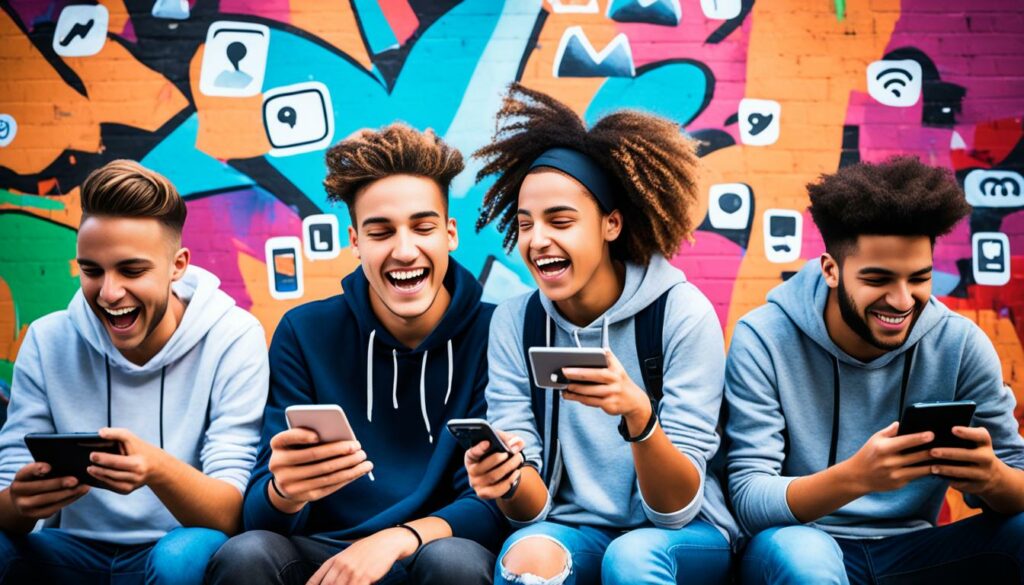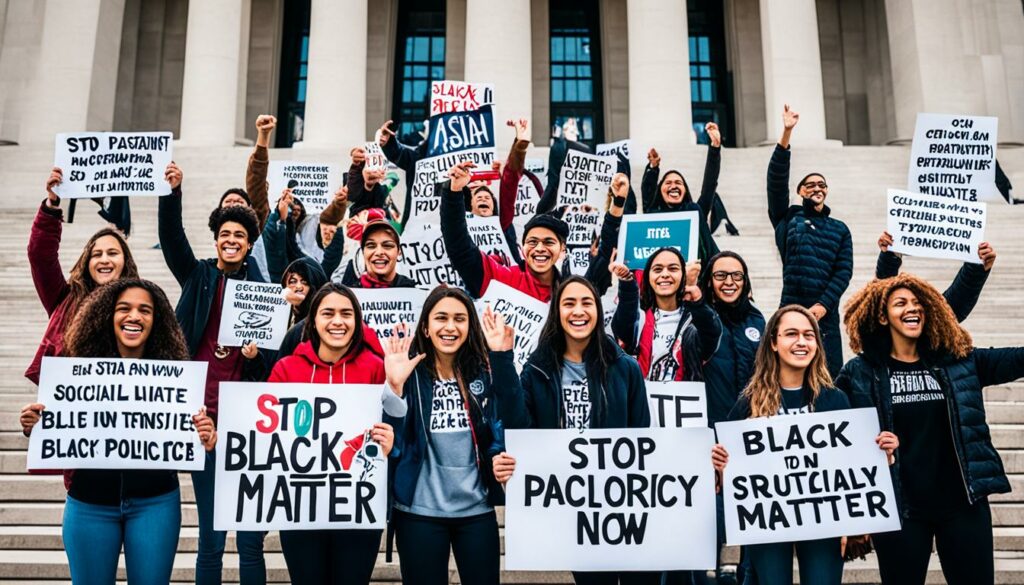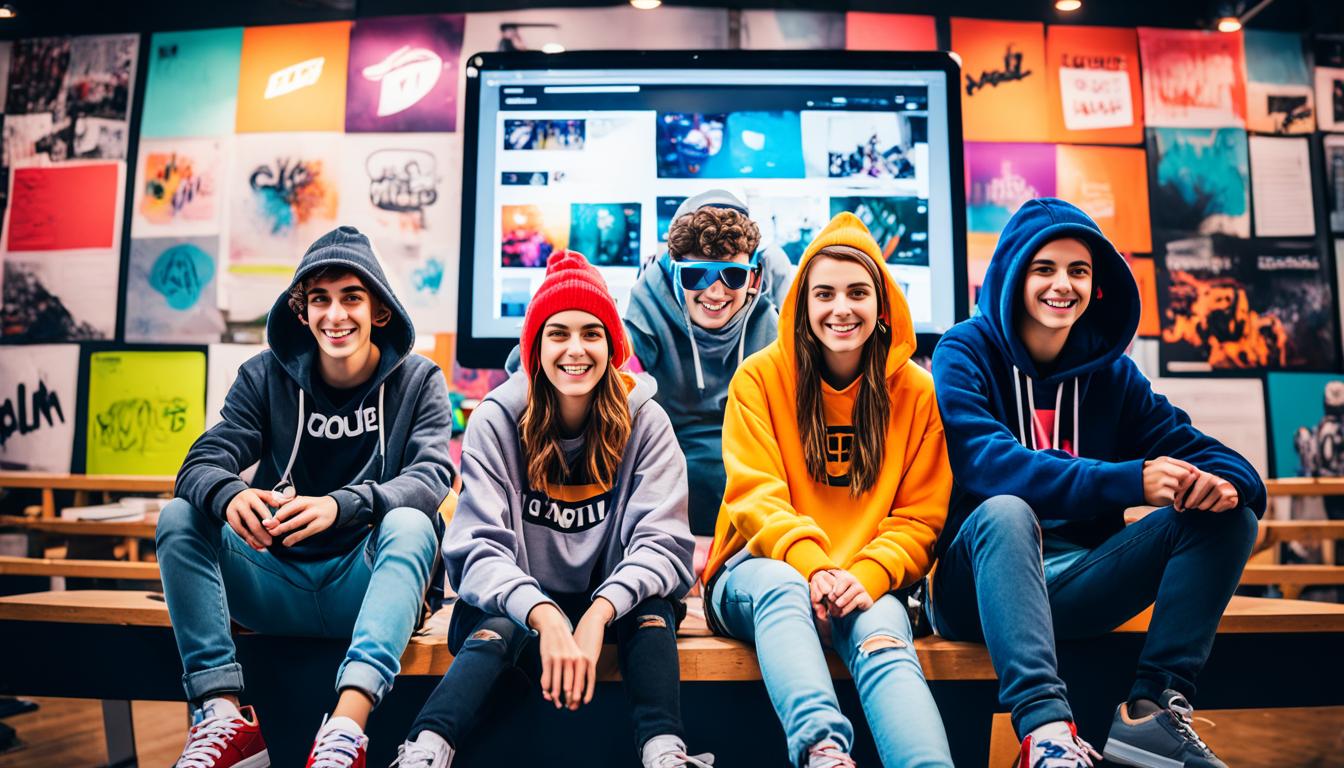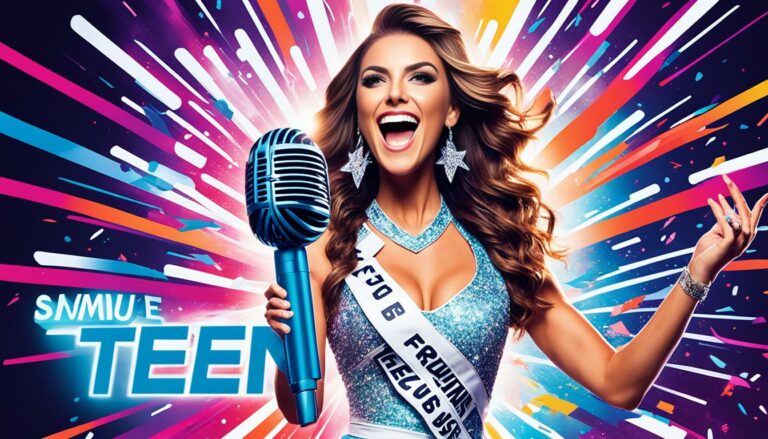What Do Teens Like? Insights on Youth Trends
Teenagers today have diverse interests and preferences that are shaped by their digital lifestyles, evolving social trends, and desire for authenticity. Understanding what teens like is essential for marketers, content creators, and anyone looking to engage with this influential demographic. Let’s explore some popular interests, favorite activities, and trends among teenagers, giving valuable insights into teen culture.
Key Takeaways:
- Teenagers are highly active on social media platforms, with YouTube being the most commonly used platform among teens in the United States.
- TikTok, Instagram, and Snapchat are also popular social media platforms among teenagers.
- Teens spend a significant amount of time on social media, particularly on YouTube and TikTok.
- Generation Z is the most racially diverse generation in America, and their exposure to different cultures has shaped their sense of identity and preference for inclusivity.
- Teenagers are passionate about social justice issues and actively engage in activism for causes they believe in.
Social Media and Tech Use Among Teens

The use of social media and technology among teens has become increasingly prevalent in recent years. A survey conducted by Pew Research Center delved into the habits and preferences of this demographic, shedding light on their usage patterns and platform preferences.
According to the survey, a majority of teens reported using popular social media platforms such as YouTube, TikTok, Instagram, and Snapchat. Notably, Facebook use among teens has declined over time, while platforms like Instagram and Snapchat have gained popularity.
Interestingly, the survey also revealed gender and racial disparities in social media use. Girls were found to be more inclined towards platforms like TikTok and Instagram, while boys showed a greater preference for other platforms.
Platform Usage Among Teens:
| Platform | Percentage of Teens Using |
|---|---|
| YouTube | 95% |
| TikTok | 72% |
| 69% | |
| Snapchat | 69% |
| 51% |
Source: Pew Research Center.
In addition to social media platforms, technology use among teens is also a significant part of their daily lives. Smartphones, in particular, play a crucial role, providing constant access to social media, entertainment, and online activities.
Despite concerns over the potential negative effects of excessive social media use, many teens find it difficult to give up or limit their usage. They have mixed opinions about its impact on themselves and others, highlighting the complex relationship between teens and social media.
The Influence of Social Media on Teens

Social media has become an integral part of teenagers’ lives, shaping their experiences and influencing their behavior. The impact of social media on teenagers is a topic of significant interest and concern, as it both connects and challenges young individuals in various ways. A survey conducted by Pew Research Center provides valuable insights into the influence of social media on teens, shedding light on their positive and negative experiences.
The Positive Impact of Social Media
Social media platforms offer teenagers a plethora of opportunities for self-expression, connection, and support. Many teens reported feeling more connected to their friends through platforms such as Instagram, Snapchat, and TikTok. These platforms allow them to share their daily lives, interests, and creative pursuits, fostering a sense of camaraderie with their peers. Social media has become a space where teens can showcase their talents, hobbies, and passions, receiving validation and encouragement from their online communities.
“With social media, I can share my artwork and get feedback from people all over the world. It’s an amazing feeling to connect with like-minded artists and learn from each other’s work.” – Emily, 16
In addition to fostering creativity and connection, social media platforms have also become valuable sources of information and support for teens. Many young individuals find solace in online communities and support groups, where they can discuss sensitive topics, seek advice, and connect with others who share similar experiences. This virtual support network plays a crucial role in providing a sense of belonging and empathy, especially for teens facing challenges in their offline lives.
The Negative Influence of Social Media
While social media offers numerous benefits, it is not without its drawbacks. The survey conducted by Pew Research Center revealed that many teens face negative experiences on social media, which can impact their mental and emotional well-being. Some teens reported feeling overwhelmed by drama or pressure to present an idealized version of themselves, fueling feelings of inadequacy.
“Social media sometimes feels like a popularity contest. It’s hard not to compare yourself to others and worry about not getting enough likes or comments on your posts.” – Ethan, 15
The constant exposure to carefully curated profiles and highlight reels of their peers can contribute to feelings of insecurity and a distorted sense of reality for teens. The quest for validation and the pursuit of societal beauty standards can take a toll on their self-esteem and mental health. Moreover, concerns about privacy and the collection of personal information by social media platforms add to teens’ sense of unease.
Teenagers’ Perspectives
It is important to recognize that the influence of social media on teenagers is not uniform and varies based on individual experiences and usage patterns. While some teens find social media to be a positive force, others face challenges navigating its influence. The survey conducted by Pew Research Center captured this diversity of experiences and perspectives, emphasizing the need for a nuanced understanding of teen engagement with social media.
Ultimately, the influence of social media on teenagers is a complex interplay of positive and negative factors. Social media platforms have the potential to connect teens, inspire creativity, and provide support, but they also present challenges to mental health and self-esteem. It is vital for parents, educators, and policymakers to foster digital literacy and open conversations that empower teens to navigate social media responsibly and harness its benefits while mitigating its potential risks.
The Influence of Social Media: A Balancing Act for Teens
As teenagers increasingly become active participants in the digital landscape, understanding the influence of social media on their lives becomes crucial. While it offers a wide array of opportunities for self-expression, connection, and support, it is important to strike a balance between the positive and negative aspects of social media engagement. By fostering a healthy and mindful approach to social media usage, teenagers can reap the benefits while minimizing the potential pitfalls.
Generation Z and Hyper Connectivity

Generation Z, also known as those born after 1997, is a highly connected generation due to their exposure to the internet from an early age. Growing up in a world where information is readily available, they have become reliant on smartphones and constant connectivity.
This hyper connectivity has significantly influenced their communication preferences. Generation Z has a preference for short-form content and mobile-first communication efforts. They are quick to adapt to emerging technologies and trends, often leading the way in digital innovation.
With smartphones as their primary tool, mobile-dependent teens spend a significant amount of time engaging with various online activities. Social media platforms, like YouTube and TikTok, act as virtual hangouts where they stay connected with friends, consume entertainment, and participate in the online community.
As a result, Generation Z is highly influenced by this hyper connectivity, shaping their behaviors, interests, and even their aspirations. They are constantly seeking new experiences and inspiration through their digital devices, fueling their creativity and desire for self-expression.
Teen Activism and Social Justice

Today’s teenagers are passionate about social justice issues and are actively engaged in bringing about change. They are strong supporters of equality and fairness, not just in terms of ethnicity and gender but across various social issues. Growing up in an era of active shooters and political unrest, teenagers are finding their voice and advocating for what they believe is right. They are leading the conversations around social, political, and environmental issues, both online and offline.
“Teenagers are the future of our society, and their activism is inspiring. They are using their voices to fight for justice and drive positive change. It’s amazing to see how passionate and determined they are in making the world a better place.”
The Rise of Gen Z Activists
Gen Z, the generation born after 1997, is at the forefront of teen activism and social justice movements. They are using social media platforms like Instagram, Twitter, and TikTok to raise awareness, organize protests, and amplify their messages. Gen Z activists are leveraging the power of digital technology to create meaningful change and influence public opinion. They are breaking barriers, challenging the status quo, and demanding a more equitable and just society.
One notable example of Gen Z activism is the global youth-led movement for climate action. Inspired by figures like Greta Thunberg, young activists around the world are demanding urgent action to address climate change. They have organized strikes, participated in online campaigns, and lobbied policymakers to prioritize environmental sustainability.
The Impact of Teen Activism
Teen activism has had a significant impact on shaping social and political discourse. Through their advocacy, young activists have successfully influenced public opinion, pushed for legislative reforms, and sparked national conversations on critical issues. They have proven that age is not a barrier to creating meaningful change and have forced institutions to listen and respond to their demands.
Furthermore, teen activism has fostered a sense of empowerment and community among young individuals. It provides them with a platform to express themselves, connect with like-minded individuals, and develop leadership skills. By participating in activism, teenagers learn about civic engagement, critical thinking, and the power of collective action.
Gen Z activists are not just fighting for causes that directly affect them but also lending their voices to support marginalized communities and combat systemic injustices. They recognize the interconnectedness of social issues and strive for a more inclusive and equitable world.
The Future of Teen Activism
As Gen Z continues to grow and become more socially and politically aware, teen activism is expected to gain even more prominence. With their digital fluency, Gen Z activists have the power to reach a global audience and create impact on a larger scale. Their ability to mobilize and organize online makes them a formidable force for change.
Teen activism is not just a passing trend; it is a reflection of the values, aspirations, and concerns of the youth. The passion and determination exhibited by young activists today are a testament to their commitment to making the world a better place for future generations.
Teen Mental Health and Well-being

Teenagers today face increasingly high levels of anxiety and depression. Unrealistic expectations, societal pressures, and excessive social media use can contribute to their mental health struggles. According to a survey conducted by the Pew Research Center, greater support and resources for teen mental health are urgently needed.
One of the major challenges highlighted in the survey is the lack of representation and awareness of mental health issues in the media consumed by teens. They are calling for more authentic and relatable portrayals of mental health in movies, TV shows, and music. By addressing these issues in popular culture, we can help to reduce the stigma surrounding mental health and create more empathy and understanding among young people.
Teens are also emphasizing the importance of support from schools and communities. Educational institutions should prioritize mental health education and provide accessible resources for students to seek help. Community organizations, such as support groups and counseling services, can play a significant role in assisting teens in managing their mental well-being.
The Impact of Teen Mental Health Challenges
“Mental health struggles can significantly impair a teenager’s overall well-being and academic performance. It is crucial that we address the unique challenges they face and provide the necessary support and resources.”
Furthermore, the survey revealed that teenagers are increasingly aware of the negative impact of social media on their mental health. The pressure to curate a perfect online image and the constant exposure to idealized representations of others’ lives can exacerbate their feelings of inadequacy and contribute to anxiety and depression.
To better support teen mental health, it is essential for parents, educators, and the wider community to enhance their understanding of these challenges. By fostering open conversations, promoting healthy coping mechanisms, and creating safe spaces for expression, we can help teenagers navigate the complexities of their emotional well-being.
Remember, teen mental health is a significant and pressing issue that requires our attention and action. Together, let’s empower and support young people in their journey towards mental well-being.
Tips for Supporting Teen Mental Health
- Encourage open and honest conversations about mental health.
- Promote healthy coping mechanisms, such as exercise, mindfulness, and creative outlets.
- Create a supportive and non-judgmental environment at home and in schools.
- Advocate for mental health education and resources in educational institutions.
- Stay informed about available mental health support services in your community.
| Mental Health Challenges | Contributing Factors |
|---|---|
| Anxiety | Unrealistic expectations, academic pressure, social comparison |
| Depression | Societal pressures, bullying, lack of social support |
| Self-esteem issues | Body image dissatisfaction, online harassment |
| Stress | Academic workload, extracurricular demands, peer pressure |
Inclusivity and Acceptance Among Teens
Generation Z, the most racially diverse generation in America, is known for their inclusive mindset and acceptance of diversity. These multicultural teens reject stereotypes and embrace individual expression and self-identity. In fact, a survey conducted by Pew Research Center found that they are more open-minded about issues of sexuality and gender compared to previous generations.
Teenagers today value authentic and varied narratives that reflect different backgrounds and experiences. They appreciate content that resonates with their sense of identity and promotes inclusivity among teens. Gen Z’s exposure to different cultures has shaped their worldview, fostering a strong belief in acceptance and diversity.
Redefining Boundaries
“Our generation understands that diversity and inclusivity make us stronger as a society. We actively challenge prejudices, advocate for equal rights, and celebrate the beauty of our differences.” – Maya Johnson, a high school student from Los Angeles
These multicultural teens challenge societal norms by championing equality and fairness, not just in terms of ethnicity and gender, but across various social issues. Their influential voices are reshaping conversations around social justice and driving change both online and offline.
Generation Z’s commitment to inclusivity and acceptance is a testament to their compassion and tolerance. By embracing diversity and rejecting discrimination, they are creating a more inclusive and equitable future.
To further highlight the impact of Generation Z’s inclusivity and acceptance, let’s take a look at the following table:
| Category | Percentage |
|---|---|
| Teens advocating for LGBTQ+ rights | 78% |
| Teens supporting racial equality | 85% |
| Teens promoting gender equality | 91% |
Teen Perspectives on Entertainment Media
When it comes to entertainment media, Gen Z, also known as today’s teenagers, has a clear message: authenticity and inclusivity matter. Teens are seeking out stories that go beyond surface-level entertainment and delve into meaningful narratives. They want to see characters who face and overcome adversity, reflecting the complexity of real-life experiences.
One key aspect of diverse storytelling that resonates with teenagers is the representation of lives different from their own. They value narratives that highlight different backgrounds, cultures, and perspectives. By portraying these diverse stories, entertainment media can foster empathy and understanding among young audiences.
Furthermore, mental health is an important topic for today’s teenagers. They appreciate when entertainment media addresses mental health issues in a thoughtful and realistic manner. Portraying characters who navigate mental health challenges can help reduce stigma and provide validation for teens going through similar experiences.
Family life and relationships also hold significant importance for teenagers. They seek representation of various family dynamics and relationships that mirror their own experiences. By showcasing relatable family dynamics, entertainment media can help teenagers feel seen and understood.
Teenagers are pushing back against content that solely focuses on fame and financial gain. They are drawn to stories that tackle real-life issues while maintaining a sense of relatability and fun. Authenticity is key, as teenagers appreciate content that reflects their lives and captures the nuances of their generation.
In summary, Gen Z is calling for entertainment media that embraces diversity, addresses mental health, and represents the realities of teenage life. By listening to the perspectives of teenagers and creating content that aligns with their preferences, the entertainment industry can engage and captivate this influential audience.
Conclusion
Teenagers today have unique preferences and interests that are heavily influenced by their digital lifestyles and social consciousness. Social media platforms like YouTube and TikTok play a significant role in their lives, offering them a platform for self-expression and connection. It is through these platforms that teens discover new trends, engage with their peers, and share their passions.
One of the key insights on teen preferences and trends is their passion for social justice issues. Today’s teenagers are passionate advocates for equality, fairness, and inclusivity. They actively engage in conversations around social, political, and environmental issues, both online and offline. Brands and content creators need to listen to their voices and reflect their concerns and aspirations in their content.
Mental health is another important aspect of teen preferences and trends. Many teenagers today struggle with anxiety and depression, influenced by various factors including societal pressures and the impact of social media. Teens are calling for better support and resources for mental health, both in their schools and communities. Content creators should address these concerns by promoting positive mental health messages and providing relatable and supportive content.
Inclusivity and diversity are also key elements that shape teen preferences. Generation Z is known for its inclusive mindset, rejecting stereotypes and embracing individual expression. Teens value authentic and varied narratives that reflect different backgrounds and experiences. They seek media content that represents the diversity of society and addresses real-life issues in a relatable and meaningful way.
By understanding and embracing these insights on teen preferences and trends, marketers and content creators can effectively engage with this influential demographic. By creating content that resonates with teens’ experiences and aspirations, brands can connect with Gen Z on a deeper level and foster a loyal and engaged audience.
FAQ
What are the most popular social media platforms among teens?
According to a survey conducted by Pew Research Center, the most commonly used social media platforms among teens in the United States are YouTube, TikTok, Instagram, and Snapchat.
How often do teenagers use social media?
The survey conducted by Pew Research Center revealed that more than half of teens use YouTube and TikTok on a daily basis.
What are some of the positive experiences teens have with social media?
Many teens reported feeling more connected to their friends, showing their creative side, and finding support through social media.
What are some of the negative experiences teens have with social media?
Some teens reported feeling overwhelmed by drama and feeling pressure to post content that gets likes and comments.
How does social media use affect teen mental health?
Factors such as unrealistic expectations, societal pressures, and social media use can contribute to increased levels of anxiety and depression among teenagers.
What are teens passionate about in terms of social issues?
Teens today are passionate about social justice issues and are actively engaged in bringing about change. They advocate for equality and fairness across various social issues.
What concerns do teens have about social media?
Many teens are concerned about the amount of personal information social media companies collect about them and feel they have little control over it.
What are some characteristics of Generation Z?
Generation Z is known for their inclusive mindset, acceptance of diversity, and rejection of stereotypes. They value individual expression and self-identity.
What do teens desire to see in entertainment media?
Teens want to see authentic and inclusive storytelling that addresses real-life issues, diversity, and mental health. They reject aspirational content that focuses solely on fame and financial gain.
How can marketers and content creators better engage with teenagers?
By understanding what teens like and resonating with their experiences and aspirations, marketers and content creators can better engage with this influential demographic.
Source Links
- https://www.pewresearch.org/short-reads/2023/04/24/teens-and-social-media-key-findings-from-pew-research-center-surveys/
- https://www.linkedin.com/pulse/top-5-teen-trends-2019-insights-gen-z-marketing-wally-sabria
- https://greatergood.berkeley.edu/article/item/what_stories_do_teens_want_to_see_in_movies_and_tv







